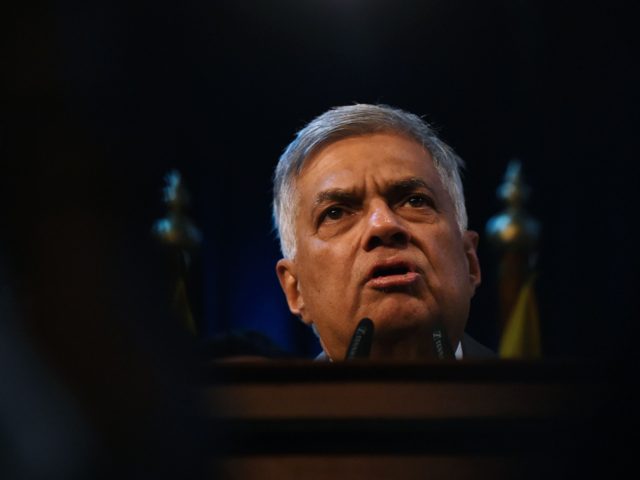Members of Sri Lanka’s prime minister’s cabinet revealed Sunday that Indian authorities warned their intelligence officials in advance of Sunday’s deadly jihadist bombings targeting Christians, but that warning never made it to the prime minister’s office.
The senior officials demanded answers from President Maithripala Sirisena on how much information they had about the radical Islamist threat and why police were unable to prevent it from happening, directing attention from the six bombings on Easter Sunday – with a mounting death toll currently standing at 290 – back to the constitutional crisis that paralyzed Sri Lankan politics late last year and left the country with a president and prime minister running nearly parallel governments.
Sri Lankan Prime Minister Ranil Wickremesinghe survived an attempt by Sirisena in November to replace him with Mahinda Rajapaksa, a former president many in the country and abroad deride as a “war criminal” for crushing a Tamil minority insurgency to end the nation’s 26-year-old civil war in 2009. Wickremesinghe and Rajapaksa served as dueling prime ministers for nearly a month before the Supreme Court found that Sirisena did not have the constitutional authority to replace Wickremesinghe.
In the aftermath of that dispute, Sirisena has allegedly kept Wickremesinghe and his staff out of major intelligence meetings, leaving them uninformed regarding ongoing threats. The situation may have prevented Sri Lankan authorities from properly dealing with National Thowheeth Jama’ath, the nascent jihadist group police believe responsible for the Easter bombings.
Sri Lanka’s Minister of Telecommunications, Foreign Employment & Sports Harin Fernando published documents on Twitter Sunday that he claimed warned Sri Lankan authorities that local jihadist group National Thowheeth Jama’ath was planning an imminent attack.
“Some intelligence officers were aware of this incidence,” he wrote. “Serious action needs to be taken as to why this was ignored.”
Some intelligence officers were aware of this incidence. Therefore there was a delay in action. What my father heard was also from an intelligence officer. Serious action need to be taken as to why this warning was ignored. I was in Badulla last night pic.twitter.com/ssJyItJF1x
— Harin Fernando (@fernandoharin) April 21, 2019
Mano Ganeshan, the minister for national integration, made the same claim.
Wickremesinghe told reporters that reports of this prior information were correct.
“Neither I nor the Ministers were kept informed,” he said.
On Monday, Rajitha Senaratne, a spokesman for Wickremesinghe’s cabinet repeated a similar claim, adding the detail that the country’s chief of national intelligence knew not only of the Islamist group, but of individuals members in it now believed to be involved in the attack.
“Fourteen days before these incidents occurred, we had been informed about these incidents,” Senaratne said, according to the UK Guardian. “On 9 April, the chief of national intelligence wrote a letter and in this letter many of the names of the members of the terrorist organization were written down.”
The reports that led to senior government officials acknowledging prior warnings followed Indian media reports, possibly founded in leaks from Indian intelligence, that suggested Sri Lankan officials knew an attack was coming for days or even weeks, but failed to act. Sri Lanka’s Daily Mirror confirmed soon after rumors began appearing in Indian media that Sri Lankan intelligence agents had a letter identifying not only the National Thowheeth Jama’ath but its individual members:
Sources confirmed that a letter signed by Deputy Inspector General (DIG) Priyalal Dasanayake dated April 11 which was widely circulated through social media pertaining to an impending attack, was authentic. The Secretary of Defense and the Establishment did not deny knowledge of the warnings of an attack. The letter specifies the suspected perpetrators too. Prime Minister Ranil Wickremesinghe also confirmed that information “was there”.
The newspaper added that officials “denied or soft-peddled” knowing who the culprits were in the immediate aftermath of the killing spree.
Wickremesinghe’s absence from presidential intelligence briefings appears to be fallout from November’s constitutional crisis. In late October, Sirisena moved to replace Wickremesinghe with former election rival Rajapaksa, bringing the government to a grinding halt. By mid-November, both men claimed to be prime minister and were attempting to execute that office’s powers. Sri Lanka’s parliament had erupted into a violent brawl in which Rajapaksa and Wickremesinghe supporters beat each other and threw hot chili powder into each other’s eyes, preventing legislators from acting in support or against Wickremesinghe’s ouster.
Sri Lanka’s supreme court found Sirisena’s move unconstitutional, the parliament voted against the move six times, and, by December, Wickremesinghe returned to office. Sirisena made clear his disdain for his prime minister by banning reporters from covering Wickremesinghe’s swearing-in ceremony. He also, as was revealed this weekend, prevented Wickremesinghe and his staff from attending intelligence meetings.
Bombings, some of which have been confirmed suicide attacks, killed at least 290 people and injured over 500 Sunday in three hotels and churches in the Colombo area, apparently targeting Christians celebrating Easter and Sri Lanka’s tourism industry. Authorities identified National Thowheeth Jama’ath as the group responsible, though no organization or individual has taken credit for the killings at press time.
Christians and Muslims are both religious minorities in largely Buddhist Sri Lanka.

COMMENTS
Please let us know if you're having issues with commenting.